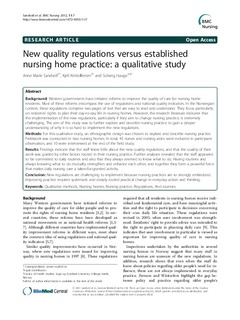| dc.contributor.author | Sandvoll, Anne Marie | |
| dc.contributor.author | Kristoffersen, Kjell | |
| dc.contributor.author | Hauge, Solveig | |
| dc.date.accessioned | 2012-08-30T14:04:27Z | |
| dc.date.available | 2012-08-30T14:04:27Z | |
| dc.date.issued | 2012 | |
| dc.identifier.citation | Sandvoll, A., Kristoffersen, K., & Hauge, S. (2012). New quality regulations versus established nursing home practice: a qualitative study. BMC Nursing, 11(1), 1-7. doi: 10.1186/1472-6955-11-7 | no_NO |
| dc.identifier.issn | 1472-6955 | |
| dc.identifier.uri | http://hdl.handle.net/11250/138756 | |
| dc.description | Published version of an article from the journal: BMC Nursing. Also available from Bio Med Central:http://dx.doi.org/10.1186/1472-6955-11-7
Open Access | no_NO |
| dc.description.abstract | Background Western governments have initiated reforms to improve the quality of care for nursing home residents. Most of these reforms encompass the use of regulations and national quality indicators. In the Norwegian context, these regulations comprise two pages of text that are easy to read and understand. They focus particularly on residents’ rights to plan their day-to-day life in nursing homes. However, the research literature indicates that the implementation of the new regulations, particularly if they aim to change nursing practice, is extremely challenging. The aim of this study was to further explore and describe nursing practice to gain a deeper understanding of why it is so hard to implement the new regulations. Methods For this qualitative study, an ethnographic design was chosen to explore and describe nursing practice. Fieldwork was conducted in two nursing homes. In total, 45 nurses and nursing aides were included in participant observation, and 10 were interviewed at the end of the field study. Results Findings indicate that the staff knew little about the new quality regulations, and that the quality of their work was guided by other factors rooted in their nursing practice. Further analyses revealed that the staff appeared to be committed to daily routines and also that they always seemed to know what to do. Having routines and always knowing what to do mutually strengthen and enhance each other, and together they form a powerful force that makes daily nursing care a taken-for-granted activity. Conclusion New regulations are challenging to implement because nursing practices are so strongly embedded. Improving practice requires systematic and deeply rooted practical change in everyday action and thinking. | no_NO |
| dc.language.iso | eng | no_NO |
| dc.publisher | Bio Med Central | no_NO |
| dc.title | New quality regulations versus established nursing home practice: a qualitative study | no_NO |
| dc.type | Journal article | no_NO |
| dc.type | Peer reviewed | no_NO |
| dc.subject.nsi | VDP::Medical disciplines: 700::Health sciences: 800::Nursing science: 808 | no_NO |
| dc.source.pagenumber | 1-7 | no_NO |
| dc.source.volume | 11 | no_NO |
| dc.source.journal | BMC Nursing | no_NO |
| dc.source.issue | 1 | no_NO |
